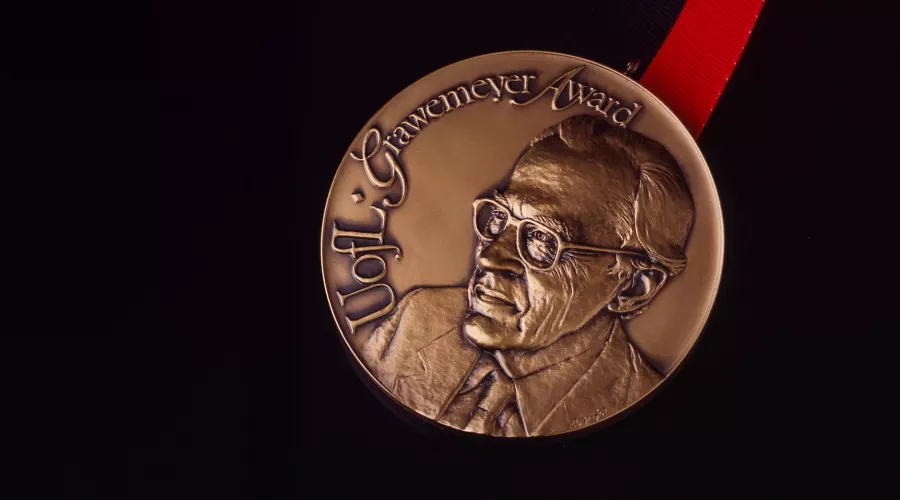The persistence of inspiration
UofL's Grawemeyer Awards turn 40 June 24, 2025
The Grawemeyer Award medal.
In 1985, celebrated Polish composer and conductor Witold Lutoslawski arrived in Louisville, Kentucky, to accept the very first Grawemeyer Award – a six-figure prize for an outstanding composition by a living composer in a large musical genre that premiered during the previous five years. Chosen from a pool of 225 entries from 18 countries, Lutoslawki’s Symphony No. 3 was first performed by the Chicago Symphony Orchestra two years before.
After accepting his award, Lutoslawski conducted Louisville Symphony’s performance of Symphony No. 3, following in the footsteps of composers including Aaron Copland, Igor Stravinski and Virgil Thomson who also directed Louisville Symphony’s performances of their work.
“Nothing this university has done has ever had such far-reaching effects,” said Jerry Ball, the School of Music dean at that time. “Despite the basketball craze and the fame our team has won for us, I doubt it has stirred up curiosity in foreign lands the same way the Grawemeyer Award has.”
The success of the Grawemeyer Award for Music Composition paved the way for four other Grawemeyer Awards: Ideas Improving World Order in 1988, Education in 1989, Religion (a prize given jointly with the Louisville Presbyterian Theological Seminary) in 1990 and Psychology in 2001. All five $100,000 awards follow the vision of H. Charles Grawemeyer ’34, who provided the $9 million endowment to honor publicly accessible ideas and compositions that can make the world better.
And all five have had far-reaching effects.
Lutoslawski set the pattern of many Grawemeyer Award winners when he dedicated his prize money for the benefit of others, such as provided funding to young Polish composers to travel outside Poland. “It is so important for younger composers to go abroad,” he said, “not just for study, but to see and hear as much as possible.”
Fiona Terry, who won the 2006 Grawemeyer Award for Ideas Improving World Order, was the beneficiary of an earlier Grawemeyer Award. The winner of world order award in 1995, Australian politician Gareth Evans, used his prize money to create a fund to support innovative thinking about peace building and cooperative security, a fund that supported Terry’s doctoral dissertation research at Australian National University. That research became the foundation of her prize-winning book, “Condemned to Repeat? The Paradox of Humanitarian Action,” which showed how humanitarian aid could be misused.
Nothing this university has done has ever had such far-reaching effects. Despite the basketball craze and the fame our team has won for us, I doubt it has stirred up curiosity in foreign lands the same way the Grawemeyer Award has.
Grawemeyer Awards in Education continue to speak to contemporary concerns decades after the awards are given. Take James P. Comer’s 2007 Education Award for his school development program. The Yale University child psychiatry professor challenged the prevailing emphasis on testing and accountability with a program that coordinated parents, teachers and other school staff members, and community members into learning collaborations based on children’s stages of development. Hundreds of low-performing schools in the U.S. that adopted Comer’s school development program saw their student achievement rise, sometimes dramatically.
The effects of one of the earliest Grawemeyer Awards in Religion are still being experienced today. In 1993, Fordham University theology professor Elizabeth A. Johnson won the Grawemeyer Award in Religion for her seminal book, “She Who Is: The Mystery of God in Feminist Theological Discourse.” Johnson showed us that the language we use to talk about God affects how we think about God. Because such language has traditionally been masculine, we have thought about God as male, emphasizing obedience over relationship. Incorporating feminine dimensions of the divine encourages us to embrace God’s empathy, care and support. Johnson’s work helped inspire inclusive scripture translations, hymnals and prayers even as some religious groups doubled down on male language and authority.
Cognitive psychologist Elizabeth Loftus won the 2005 Grawemeyer Award in Psychology for her studies that showed that memory is susceptible to suggestion. “Memory (does not work) like a recording device,” she said. “Memory works a little bit more like a Wikipedia page – you can go in there and change it, but so can other people.” This finding became particularly controversial in cases of memories recovered by alleged victims of trauma because true memories recovered from selective amnesia became hard to distinguish from memories of events that never happened. This discovery made Loftus a regular in courtrooms, the lecture circuit and on television programs including “NOVA” and “60 Minutes.”
In the 40 years since Lutoslawski accepted the inaugural Grawemeyer Award, the five collective awards have brought 164 renowned thinkers to campus, annually inspiring the university community, the city of Louisville and perpetually associating UofL with creative compositions and powerful ideas that persist.
2025 Grawemeyer Award Winners
Christian Mason | Music Composition
John M. Owen IV | World Order
Mark R. Warren | Education
Rabbi Julia Watts Belser | Religion
James Gross | Psychology
Read more about the 2025 winners at grawemeyer.org
Explore more stories from the spring/summer 2025 issue of UofL Magazine
John Ferré is a professor in the Department of Communication and the executive director of the Grawemeyer Awards.
UofL Magazine is the university's premier magazine for alumni and friends. To submit story ideas, provide feedback or contact the editor, please email editor@louisville.edu.
Related News



